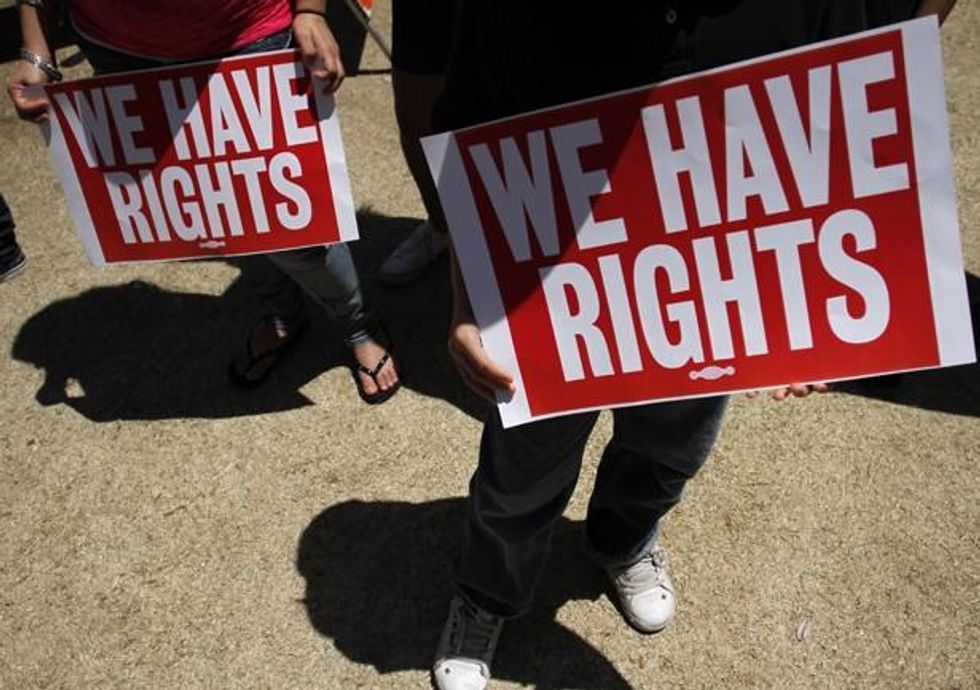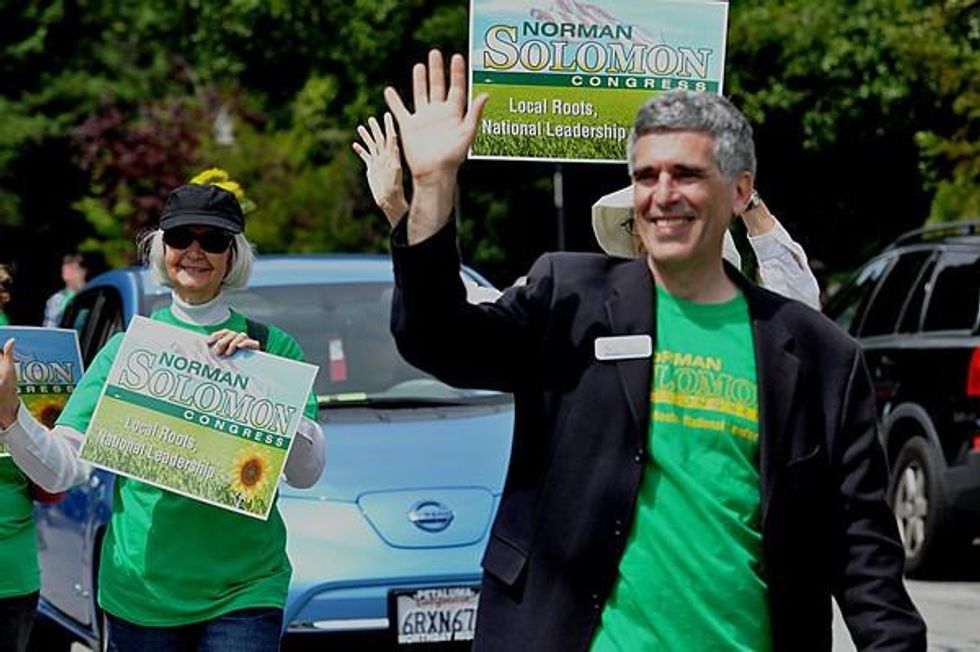It's true that many left-of-center groups are becoming more sophisticated in their use of digital platforms for messaging, fundraising and other work. But it's also true that President Obama's transactional approach has had demoralizing effects on his base. Even the best resources--mobilized by unions, environmental groups, feminist organizations and the like--can do only so much when many voters and former volunteers are inclined to stay home. A month before the 2010 election, Obama strategist David Axelrod noted that "almost the entire Republican margin is based on the enthusiasm gap." A similar gap made retaking the House a long shot this year.
For people fed up with bait-and-switch pitches from Democrats who talk progressive to get elected but then govern otherwise, the Occupy movement has been a compelling and energizing counterforce. Its often-implicit message: protesting is hip and astute, while electioneering is uncool and clueless. Yet protesters' demands, routinely focused on government action and inaction, underscore how much state power really matters.
To escape this self-defeating trap, progressives must build a grassroots power base that can do more than illuminate the nonstop horror shows of the status quo. To posit a choice between developing strong social movements and strong electoral capacity is akin to choosing between arms and legs. If we want to move the country in a progressive direction, the politics of denunciation must work in sync with the politics of organizing--which must include solid electoral work.
Movements that take to the streets can proceed in creative tension with election campaigns, each one augmenting the other. But even if protests flourish, progressive groups expand and left media outlets thrive, the power to impose government accountability is apt to remain elusive. That power is contingent on organizing, reaching the public and building muscle to exercise leverage over what government officials do--and who they are. Even electing better candidates won't accomplish much unless the base is organized and functional enough to keep them accountable.
Politicians like to envision social movements as tributaries flowing into their election campaigns. But a healthy ecology of progressive politics would mean the flow goes mostly in the other direction. Election campaigns should be subsets of social movements, not the other way around. Vital initiatives to break the cycles of capitulation and lack of accountability will come from the grassroots.
* * *
"Bringing the vibrancy and democracy of activist movement culture to a political campaign is necessary but complicated," said Torie Osborn, a longtime progressive organizer in the Los Angeles area, whose dynamic grassroots campaign for the state legislature nearly advanced to the November ballot. "Activist protest culture is spontaneous, often angry and wildly uncontrollable. Campaigns have to be rigorously disciplined and controllable."
The mismatch takes a toll. "Ultimately one shortfall of our heartbreaking 1 percent loss was that our volunteers did not show up in force until the very end," Osborn told me. "Our field program counted on a 'movement' turnout, but our experience was that the energized volunteers didn't really want to do what the campaign needed. They wanted to be on Facebook, to blog, to go to events, even drive around and put up lawn signs, but not the voter-contact work of walking and phoning--at least not at the scale we were counting on."
Osborn's assessment tracked with my simultaneous experience as a candidate for Congress in California's North Coast district, a mostly liberal area north of the Golden Gate Bridge. Our campaign drew on my four decades of activism and several years of groundwork, including hundreds of speeches and other public appearances in the district. I'd been a member of the state Democratic Party's central committee since 2007, and our campaign had traction inside the party--despite the fact that its hierarchy was hot-wired for my main opponent, Jared Huffman, a five-year state legislator who had boosted his career with major donations from big corporations.
During my run for Congress, I participated in Occupy demonstrations in more than a half-dozen cities across our far-flung district. (Because of my long record as an activist, some local Occupy organizers set aside their aversion to allowing a candidate to speak.) A deft organizer of some of those protests, Pat Johnstone, coordinated much of my campaign's fieldwork. "From the beginning, Occupiers have expressed concern about being 'co-opted' by progressive groups," she observed. "Occupy provided a renewed vision of what is possible when we rise up together. However, the success of any movement depends on building and sustaining capacity. Partnerships and coalitions are an important part of that growth. How strong can any grassroots movement be without the strength of numbers?"
Early on, I announced that our campaign would not accept money from lobbyists or corporate PACs. Instead, we kept our eyes on small donors. I spoke at more than fifty house parties, and we developed a large e-mail list to update supporters while asking for contributions and volunteers. The campaign drew in hundreds of volunteers and more than 7,000 individual donors, raising $750,000. We approached fundraising as an outgrowth of grassroots support--not the other way around.
Our organizing approach and my unabashed progressive positions paid off as our campaign fought for support from unions. The first breakthrough came from the legendary longshore union ILWU, which followed up its endorsement by hosting a fundraiser. I also received solo endorsements from AFSCME locals and the UAW, along with a dual endorsement from the California Federation of Teachers and a triple endorsement from SEIU California. Another major victory came when our campaign jolted expectations by depriving Huffman of a pre-primary endorsement from the California Teachers Association. Those hard-won victories were partly the result of my strong pro-labor commitments, like unequivocal defense of pensions. But sadly, the progressive California Nurses Association stayed out of the race. And the bulk of the labor establishment--including the building trades, the big labor council in the district and the state labor federation (AFL-CIO)--lined up with the garden-variety liberal Democratic politician making his way up the ladder.
I was fortunate to get support from several progressives in Congress. Strong endorsement letters went out from Representatives John Conyers and Raul Grijalva. Days before the June election, Representative Dennis Kucinich campaigned alongside me. But in the district it was a different story with retiring Congresswoman Lynn Woolsey, whose fervent antiwar politics have lost steam when approaching endorsements. In 2010 she went far out of her way to help Jane Harman, a leading pro-war congresswoman and Blue Dog Coalition member, fend off a primary challenge from an antiwar progressive. This year, thirty-six hours after primary election night (with 40,000 votes still uncounted and a small margin between me and the runoff), Woolsey endorsed Huffman--who has never indicated that he will challenge the military-industrial complex. The takeaway: we need to build an independent progressive power base instead of relying on any politician.
After campaigning nonstop for eighteen months, I received more than 25,000 votes in the primary (15 percent) and missed getting into the November runoff by 174 votes. (Huffman finished in first place, with 37.5 percent.) With just two Republicans among the dozen contenders in the "top-two open primary," one of the GOP candidates slipped through to the fall ballot. If I'd gotten past the primary and consolidated progressive support, I would have gone into the general election with an initial base of about 30 percent. At that point, I would have had to pull quite a populist rabbit out of the hat to win.
"Technically, our campaign has ended," I wrote to supporters after the protracted vote count. "Politically, it's continuing--with plans to build an ongoing coalition on the foundation of what we've already done together." Dozens of people involved in my campaign quickly went to work on other ones with heightened skills, knowledge and abilities to draw in volunteers. Meanwhile, our campaign is morphing into a coalition for the long haul (GrassrootsProgress.org), aiding efforts to elect progressives to local office within our district as well as to Congress elsewhere in the country.
* * *
Overall, progressive insurgencies did not perform well in House primaries this year. A few bright spots appeared when David Gill beat the Democratic machine in a central Illinois district and liberal challengers took out centrist incumbents in Texas and Pennsylvania. But even with high-profile support from national netroots groups, progressive candidates--notably Ilya Sheyman in Illinois, Eric Griego in New Mexico and Darcy Burner in Washington State--lost by sizable margins. Each contest had its own dynamics (Burner was outspent six to one by a self-financed opponent who dropped $2.3 million, whereas Griego had a money advantage), but the pattern is grim.
Yes, progressives are usually underfunded, and money matters a lot. But it's hazardous to internalize Mark Hanna's timeworn dictum, "There are two things that are important in politics. The first thing is money, and I can't remember what the second one is." We forget the second thing at our peril. In a word, we need to organize.
For progressives, ongoing engagement with people in communities has vast potential advantages that big money can't buy--and hopefully can't defeat. But few progressive institutions with election goals have the time, resolve, resources or patience to initiate and sustain relationships with communities. For the most part, precinct organizing is a lost art that progressives have failed to revitalize. Until that changes, the electoral future looks bleak.
In my race, basic progress ended up reflected in vote totals to the extent that I was able to reach out and talk with people over the course of years. Yet many of the shortcomings of my campaign were related to fieldwork. Votes slipped through our fingers when we didn't do adequate follow-up with contacts made long before election day. As our campaign grew, so did the dilemmas of time, staff, volunteers and money. By any measure, we ran the strongest grassroots campaign in the race, but it wasn't grassroots enough.
Fragmentation of core constituencies was another problem. From the outset, it was obvious that half of the twelve candidates didn't have a snowball's chance of getting through the primary. With rhetoric that sounded leftish, those six candidates received a combined total of 8.6 percent of the primary vote, while I lost by 0.1 percent. Huffman was no doubt exceedingly grateful to these anemic "protest candidates"; he could go on a cakewalk to the November runoff against a GOP candidate in a heavily Democratic district.
My counsel to prospective candidates: do not launch a campaign unless you can give it your all and plausibly consolidate most of the progressive electorate along the way. Do thorough groundwork for a long time. Keep meeting people and adding to your database of contacts. Listen and learn about political microclimates. Work on building coalitions. Encourage volunteers and treat them with respect. Insist on meticulous, accurate and principled work from staff. Remember that better process is much more likely to result in better decisions; when disagreements flare within the team, strive to assess the clashing outlooks. Keep your eyes on the prize: not only winning but also making progressive activists and groups stronger for the long haul.
A campaign with resonance should keep evolving after the election. Donor files, e-mail lists, working relationships, infrastructure, public good will and more can sustain and expand alliances. High-quality compost from one campaign should invigorate the growth of others.
Winning or losing an election can hinge on the decisions of just one group or even one individual. We may not feel powerful, but an internalized sense of powerlessness represents another triumph for a system that thrives on vast imbalances of power. Let's get more serious--and effective--about gaining progressive power in government, shall we?


